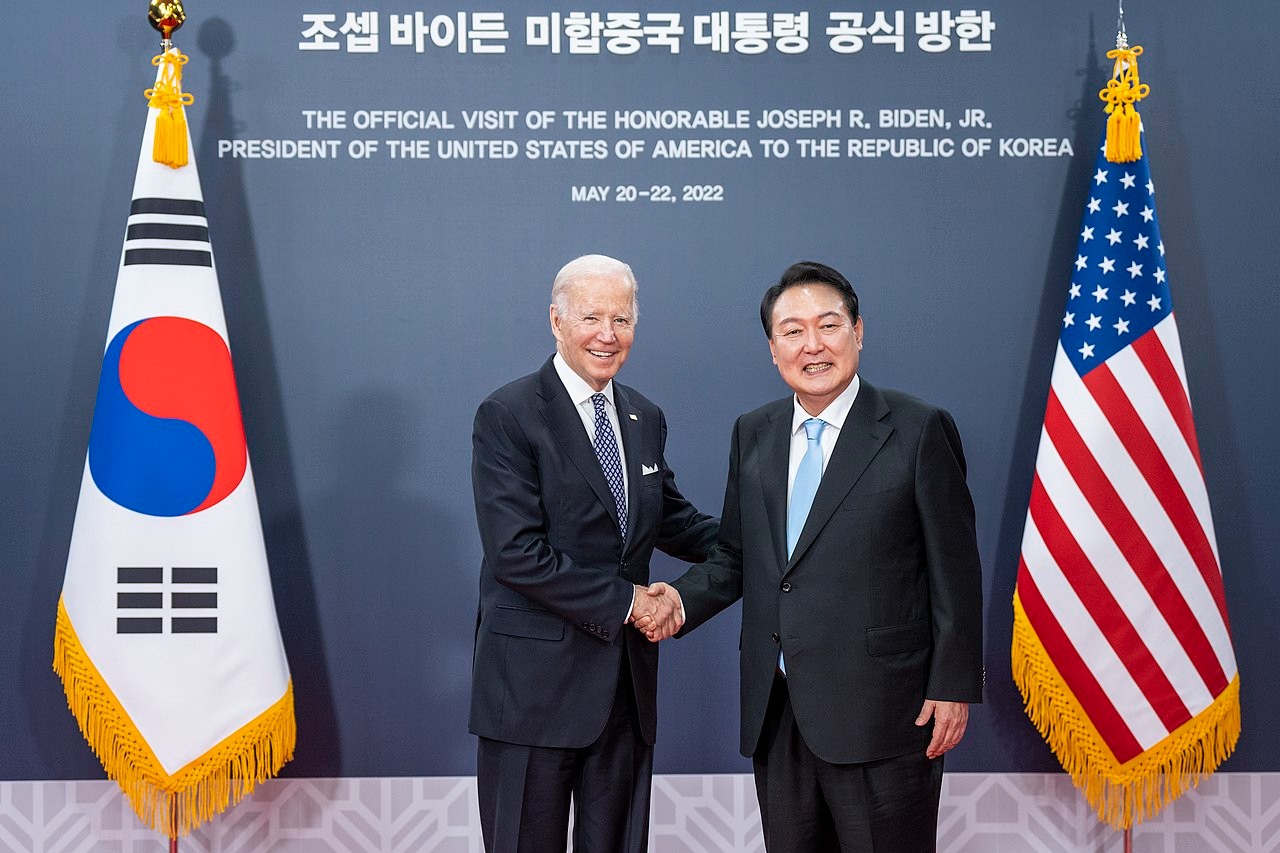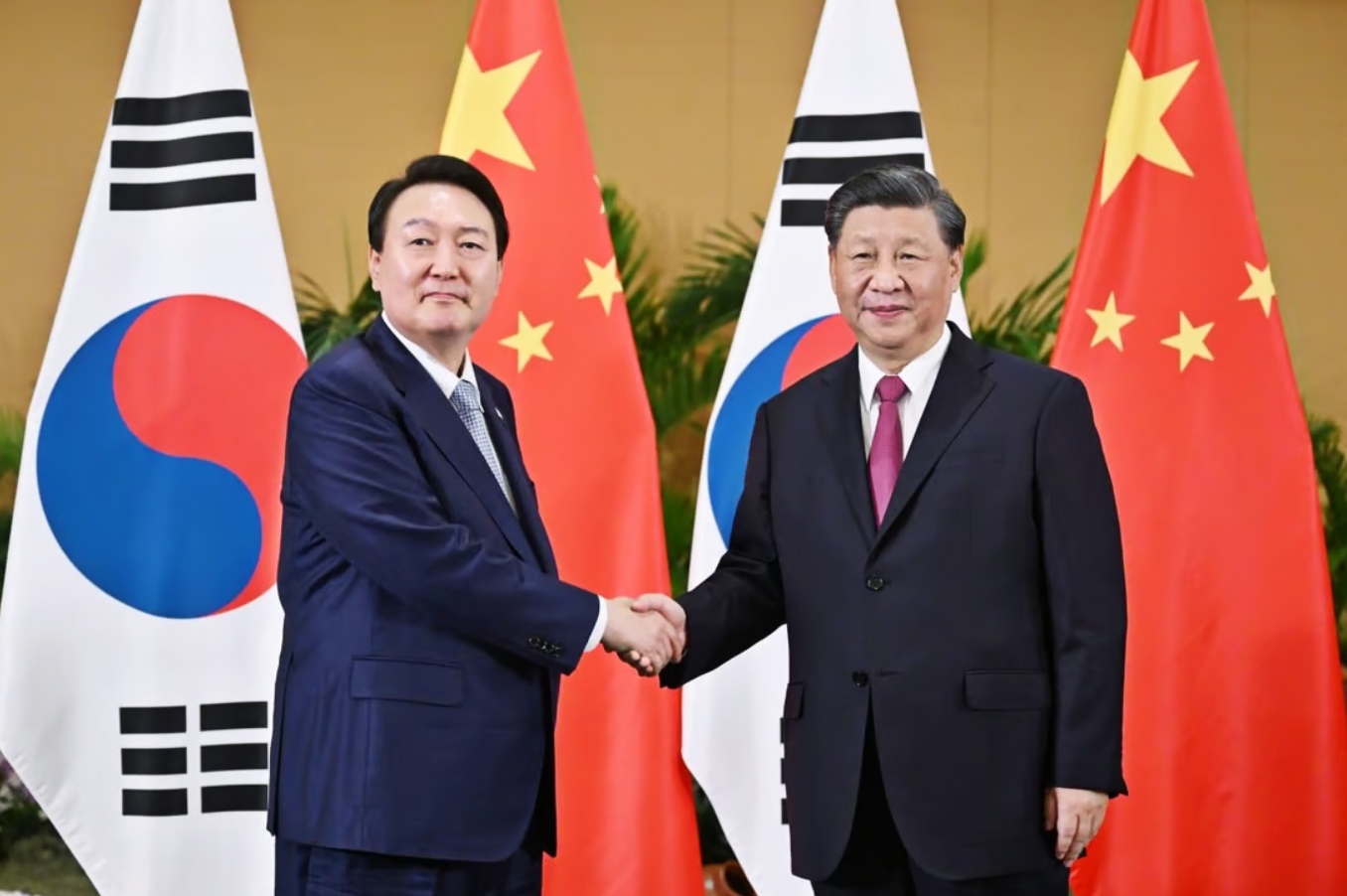The Republic of Korea, better known as South Korea, seems to be under increasing pressure from the United States and China to choose which side it should be on to further its national interests.
Though geopolitics and geoeconomics in the Indo-Pacific are intrinsically interlinked, South Korea’s standard policy has been that while its alliance with the United States is absolutely crucial for the country’s security and integrity, economic ties with China are essential for furthering the national economy.
However, beyond its traditional expertise in automobile, shipping, and electronic sectors, South Korea’s economic prowess now comprises semiconductors, electric vehicle batteries, biotech, and telecoms. And each of these sectors has security and financial implications for South Korea, China, and the United States.
However, the difference between the United States and China lies in the fact that while the United States is wooing South Korean industries, China is wooing and threatening.
And these Chinese threats are being linked to the so-called restraining role that Beijing is playing towards a stable, if not friendly, relationship between Seoul and Pyongyang. China is also intimidating because it would play an active role in dividing the South Korean polity on the present government’s foreign and security policies.
Let us begin with the wooing part. Chinese firms are lining up to invest in South Korea’s battery industry because they want to use it as a gateway to the US market, closed otherwise by the US to limit China’s involvement in the electric car supply chain.
They are announcing projects worth at least $4.4 billion this year to try to meet US electric vehicle (EV) tax credit rules aimed at lowering reliance on China’s supply chains.
The Chinese are looking to take advantage of South Korea’s free-trade agreement with the US, under which batteries made by South Korean companies and installed in US-made electric cars will likely qualify for tax breaks under US President Joe Biden’s Inflation Reduction Act (IRA).
The IRA requires that at least 40% of the value of critical minerals used in an auto battery be sourced from the United States or a free trade partner to qualify for a $3,750 tax credit per vehicle.
The IRA, designed to wean the US off the Chinese supply chain for electric vehicles, will also eventually bar tax credits if any EV battery components were manufactured by a “foreign entity of concern,” “a provision aimed at China.”
Chinese firms dominate the global battery and battery-materials supply chain, churning out cathodes, anodes, and precursors for South Korea’s three leading EV cell manufacturers — LG Energy Solution, Samsung SDI, and SK On. The trio then supplies electric vehicle makers like General Motors, Tesla, and Volkswagen. These companies are eligible for federal tax credits under the free-trade agreement with the United States.

These companies or their sister concerns are also leading chipmakers, and by supplying chips to the US, they are also eligible to receive billions of dollars in US subsidies as the Biden administration seeks to attract Korean technology and manufacturing prowess and reduce the role of China in US supply chains. But then, the South Korean companies produce a substantial quantity (in certain cases up to 50 percent) of their chips at plants located in China! That is something that the Americans are disturbing the Americans.
One may now turn toward the threatening part of the story as far as China is concerned. On June 8, Xing Haiming, Chinese Ambassador to South Korea, is said to have issued a threat through his so-called “bet” remarks. Warning South Korea against “decoupling” from the Chinese economy under the influence of the US, Xing said, “I can assure you, those who bet on China’s defeat will regret it.”
Xing was terribly unhappy that under President Yoon Suk Yeol, South Korea was pursuing the United States’ anti-China policies and ultimately posing a security threat to China. Xing complains that Yoon’s permission for port visits by US nuclear submarines in the Korean peninsula and his zeal for strengthening trilateral security cooperation among South Korea, the United States, and Japan are apparently targeted at China.
Xing branded President Yoon’s participating in the Indo-Pacific Economic Framework (IPEF) and “Chip 4 alliance” and practicing economic policies to diversify import sources of strategic materials as “de-Sinicization” and negation of his predecessor Moon Jae-in’s “Three Nos” policy.
It may be noted that “Chip 4” is the US-led semiconductor alliance – South Korea, the United States, Japan, and Taiwan. According to South Korean Minister of Trade, Industry, and Energy Lee Chang-yang, “Korea has strengths in memory semiconductors, Taiwan has strengths in foundries (contract manufacturing of semiconductors), the United States has strengths in equipment technology, and Japan has strengths in materials and components… Discussions are taking place among the countries concerned about training human resources, cooperating in technology development, and exchanging information.”
As regards the “Three Nos,” it was South Korea’s then-President Moon Jae-in who had offered China three assurances to China in 2017, following China imposing sanctions in 2016 on Seoul for acquiring the US-made Terminal High Altitude Area Defense (THAAD) anti-ballistic missile.
Under Moon, Seoul undertook not to add new batteries to the THAAD system, not to participate in a US missile defense network, and not to join a trilateral military alliance with the US and Japan.
It seems President Moon was coerced to do this to please China. Because after the deployment of THAAD, China instituted a range of informal measures to punish both the Lotte group, which previously owned the property on which the THAAD system was deployed, and other South Korean economic interests.
“Lotte’s supermarket division in China faced a rash of alleged fire safety violations that forced at least 87 of Lotte’s 99 stores in China to close and cost the firm an estimated $1.7 billion before it pulled out of China.” It is said that the Chinese countermeasures related to THAAD cost the South Korean economy an estimated $24 billion.
Ambassador Xing has indicated similar Chinese threats and played the North Korean card. It seems China is conveying that denuclearization and peace on the Korean Peninsula are impossible without Beijing’s cooperation.
Another aspect of Xing’s threat was to create a favorable political environment for China by exploiting divided public opinion in South Korea. It may be noted that his statement was delivered in a meeting with opposition leader Lee Jae-myung of the Democratic Party of Korea, the party of former President Moon Jae-in.
South Korean scholars Cha Du Hyeogn and Lee Dong Gyu argue that under a democratic political system, public opinion in South Korea is significantly divided between conservative and so-called progressive views. “Therefore, China’s signaling of opposition to the current government through a meeting with the leader of the opposition party could be seen as a psychological warfare tactic to capitalize on the political inclinations of the audience and create a favorable environment for China.”
Will all these pressure tactics of China succeed? Not really. Some experts suggest that, on the contrary, the Chinese pressure will further cement the ties between the United States and South Korea.

Scott A. Snyder, a specialist on Korea, argues, “Renewed retaliation against South Korea could have unintended consequences. While the Yoon administration has an interest in limiting its exposure to potential political or economic retaliation by Beijing, a sustained downward trajectory in China-South Korea relations could remove South Korea’s remaining inhibitions about normalizing the US deployment of THAAD batteries on the peninsula or boosting trilateral security cooperation with the United States and Japan.
“For instance, the Yoon administration could become more inclined to participate in developing a regional missile defense system or enhancing multilateral defense cooperation, steps China attempted to discourage in talks with the previous Moon Jae-in administration.”
Even economically, the Chinese threat may result in South Korea further reducing its dependence on China and Korean companies investing more in South Korea itself, according to a Financial Times report. It quoted Yeo Han-koo, who until last year served as South Korea’s trade minister and is now a senior fellow at the Peterson Institute for International Economics, saying, “The US-China tensions are making people nervous. But they can be a big opportunity for South Korea.”
It also quoted Je Hyun-Jung, chief representative of the Korea International Trade Association’s Washington office, arguing how in recent years, Korean companies in sectors ranging from nuclear power to K-pop have been intensifying their efforts to break into markets in Europe, India, the Middle East, Latin America, and south-east Asia.
“Korea is a small country stuck between big countries,” she said, adding, “That feeds a perpetual sense of crisis, this negativity you can observe now. But it’s precisely this sense of crisis that drives the country to succeed.”
- Author and veteran journalist Prakash Nanda is Chairman of the Editorial Board – EurAsian Times and has been commenting on politics, foreign policy, on strategic affairs for nearly three decades. A former National Fellow of the Indian Council for Historical Research and recipient of the Seoul Peace Prize Scholarship, he is also a Distinguished Fellow at the Institute of Peace and Conflict Studies.
- CONTACT: prakash.nanda (at) hotmail.com
- Follow EurAsian Times on Google News




